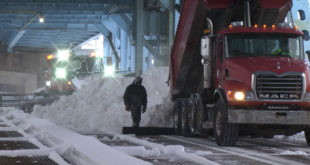SAULT STE MARIE, Michigan — The Coast Guard is reminding boaters to prepare for cold water despite warmer air temperatures, Friday.
Although air temperatures are predicted to exceed 80 degrees this week, water temperatures of Lakes Superior, Michigan and Huron are still only in the high 30s to low 50s.
“Many people might not realize, but water as warm as 76 degrees is still considered cold and carries a significant risk for those unprepared for sudden immersion,” said Mike Baron, the recreational boating and water safety specialist for the Ninth Coast Guard District.
The Coast Guard urges boaters preparing to get back out on the water this season to take caution and give proper attention to the risks of drowning and hypothermia from being immersed in cold water.
“Warm and sunny days may lead to an increase of boaters, but water temperatures are still cold,” said Lt. Creighton Chong, the public affairs officer for Coast Guard Sector Sault Ste. Marie. “Wearing a life jacket and additional clothing will increase your survivability for rescue crews to save you in the event you unexpectedly fall into the water. The Coast Guard also has a smart phone app that contains information that will increase boater safety. It can be found by simply searching ‘United States Coast Guard’ in the app store.”
The Coast Guard urges boaters to follow these cold water safety tips:
* Always wear a life jacket, and be sure there is one for each passenger on board. Wearing a life jacket can prevent a person from becoming completely submerged during a fall into cold water, and help prevent involuntarily inhaling water from the natural gasp reflex, which can cause drowning. A life jacket can keep you afloat and dramatically increase your chances of survival.
* Dress appropriately for the water temperatures and not the air temperatures when going out onto the water.
* Whether powerboat, sail or paddlecraft, make your on-water activities social. Share where you’re going and when you’ll be back with family and friends; file a floatplan.
* Use the buddy system and never go out on the water alone.
* Wear reflective clothing to make it easier for searchers to spot you if you fall overboard.
* Carry and register a personal locator beacon in addition to a VHF-FM marine radio to immediately alert the Coast Guard and local response agencies of potential distress.
 Keweenaw Report Your Source for Local News and Sports
Keweenaw Report Your Source for Local News and Sports





